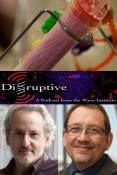NEW – Gar Alperovitz – What will replace corporate capitalism in the US?
Written on July 6th, 2018As alarming as the news may be, we must not only oppose and alter the bad news, but we must also envision a possible future for the US that people deserve – as well as a path to get there. That is the mission of historian, political economist, activist, and writer, GAR ALPEROVITZ, co-chair of the Next System Project at the Democracy Collaborative, and someone who’s thinking seriously about what replaces corporate capitalism. You can learn more at garalperovitz.com
NEW – Brad Friedman – How secure are our votes in November’s midterm elections?
Written on June 29th, 2018Midterm elections take place November 7th – less than 20 weeks from the day we record this interview. Our democracy is under threat and the validity, accuracy, and reliability of our voting and vote-counting is as well. I talk about those threats and what we can do about them with BRAD FRIEDMAN, an independent investigative blogger, journalist, and muckraker who’s broken numerous stories over the past 15 years. You can learn more at BradBlog.com
NEW – David Faris – Time for the Dems to Fight Dirty
Written on June 14th, 2018On a national level and in many states, the GOP know that if politics and elections are played fair and square, they lose. So they turn to gerrymandering, voter suppression, the refusal to act on Obama’s nomination of Merrick Garland to the Supreme Court, etc. I talk with DAVID FARIS about the ideas in his new book, IT’S TIME TO FIGHT DIRTY: How Democrats Can Build a Lasting Majority in American Politics.
http://theweek.com/authors/david-faris
NEW Free Forum – ARLIE HOCHSCHILD Strangers in Their Own Land: Anger & Mourning on the American Right
Written on April 13th, 2018ARLIE HOCHSCHILD asks why residents of the nation’s second poorest state vote for candidates who resist federal help? Why, when corporations devastate their lives and their land, do they most hate the government? After five years talking with folks in Southern Louisiana, she sensed that a particular “deep story” they share holds their political contradictions together. We’ll talk about that story and wrestle with the challenge: What story can we offer them of a future more inviting than the past?
http://sociology.berkeley.edu/professor-emeritus/arlie-r-hochschild
DISRUPTIVE DISRUPTIVE: CONFRONTING SEPSIS – Don Ingber and Mike Super
Written on October 2nd, 2015
Wyss Institute for Biologically Inspired Engineering
DISRUPTIVE: CONFRONTING SEPSIS
Terrence McNally interviews Don Ingber and Mike Super
[00:04] Hello, I’m Terrence McNally and you’re listening to DISRUPTIVE the podcast from Harvard’s Wyss Institute for Biologically Inspired Engineering.
The mission of the Wyss is to: Transform healthcare, industry, and the environment by emulating the way nature builds.
Our bodies — and all living systems — accomplish tasks far more sophisticated and dynamic than any entity yet designed by humans. By emulating nature’s principles for self-organizing and self-regulating, Wyss researchers develop innovative engineering solutions for healthcare, energy, architecture, robotics, and manufacturing.
They focus on technology development and its translation into products and therapies that will have an impact on the world in which we live. So the Wyss is not interested in making incremental improvements to existing materials and devices, but in shifting paradigms. In this episode of DISRUPTIVE, we will focus on: CONFRONTING SEPSIS
Sepsis is a bloodstream infection in which the body’s organs become inflamed and susceptible to failure. The leading cause of hospital deaths, sepsis kills at least eight million people worldwide each year.
It can be caused by 6 species of fungi and 1400 species of bacteria. Diagnosis takes two to five days, and every hour you wait can increase the risk of death by 5-9%. The treatment challenge grows more complex as the prevalence of drug-resistant bacteria increases while the development of new antibiotics lags.
“Even with the best current treatments, sepsis patients are dying in intensive care units at least 30% of the time,” says one of today’s guests, Wyss Senior Staff Scientist Mike Super.
A new device developed by a team at Wyss and inspired by the human spleen may radically transform the way we treat sepsis. Their blood-cleansing approach can be administered quickly, even without identifying the infectious agent. In animal studies, treatment with this device reduced the number of targeted pathogens and toxins circulating in the bloodstream by more than 99%.
Although we focus here on treatment of sepsis, the same technology could in the future be used for other applications, including removing microbial contaminants from circulating water, food or pharmaceutical products.
Now let’s explore the development process with Mike Super and Wyss Founding Director, Don Ingber.
[02:25] Ingber leads the Biomimetic Microsystems platform at Wyss in which micro-fabrication techniques from the computer industry are used to build functional circuits with living cells as components. He’s authored more than 400 publications and over 100 patents.
[02:40]
The seeds of Wyss’s therapeutic sepsis device go back over twenty years. I ask Don to talk about some of the earlier explorations and findings that laid the foundations for the current work.
Ingber:
[02:51] I was interested in mechanics and biology, this idea that mechanical forces are as important as chemicals and genes, and that the shape of the cell is important. To get at testing that, I come up with the idea of using little magnetic particles that I would coat with molecules that would bind to specific receptors on cells.
Continue reading “DISRUPTIVE DISRUPTIVE: CONFRONTING SEPSIS — Don Ingber and Mike Super”

